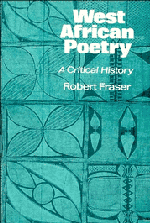Book contents
- Frontmatter
- Contents
- Acknowledgements
- West Africa: State borders and principal ethnic groupings
- Introduction
- 1 From oral to written verse: development or depletion?
- 2 Ladies and gentlemen
- 3 The négritude movement
- 4 Poetry and the university, 1957–63
- 5 The achievement of Christopher Okigbo
- 6 Continuity and adaptation in Ghanaian verse, 1952–71
- 7 Two Ijo poets
- 8 ‘Psalmody of sunsets’: The career of Lenrie Peters
- 9 The road to Idanre, 1959–67
- 10 The poet and war, 1966–70
- 11 The poetry of dissent, 1970–80
- 12 The return to orality
- A guide to availability
- Index
4 - Poetry and the university, 1957–63
Published online by Cambridge University Press: 03 May 2011
- Frontmatter
- Contents
- Acknowledgements
- West Africa: State borders and principal ethnic groupings
- Introduction
- 1 From oral to written verse: development or depletion?
- 2 Ladies and gentlemen
- 3 The négritude movement
- 4 Poetry and the university, 1957–63
- 5 The achievement of Christopher Okigbo
- 6 Continuity and adaptation in Ghanaian verse, 1952–71
- 7 Two Ijo poets
- 8 ‘Psalmody of sunsets’: The career of Lenrie Peters
- 9 The road to Idanre, 1959–67
- 10 The poet and war, 1966–70
- 11 The poetry of dissent, 1970–80
- 12 The return to orality
- A guide to availability
- Index
Summary
The turning point for the future of English language verse in West Africa came in the late 1940s with the setting up in various British colonial territories in university colleges initially affiliated to the University of London. Previously those who wished to embark upon a course of higher education had either to set sail for Europe or America, or wend their way to Fourah Bay College in Freetown, Sierra Leone, established in 1827 but still in 1945 primarily geared to the training of aspirants to the Christian ministry. The forces of history in the 1930s and 1940s had ensured that such poetry as had been written was subjected to the needs of pressing political objectives. The establishment of university communities, however, provided a zone free from public pressure where younger writers could find their feet, experiment and test themselves against the example of literature which, in the syllabuses pertaining in those years, came exclusively from abroad.
From 1948 until at least 1962, when it achieved autonomous status as an independent university institution, the University College of Ibadan drew its staff largely from among the younger graduates of British colleges, themselves trained in the traditional disciplines. The same was true of the University College of the Gold Coast, initially set up in Achimota as a training ground for teachers.
- Type
- Chapter
- Information
- West African PoetryA Critical History, pp. 73 - 103Publisher: Cambridge University PressPrint publication year: 1986



